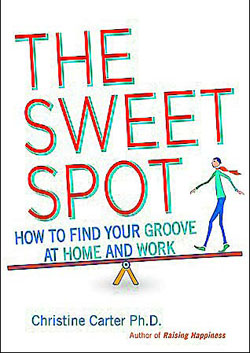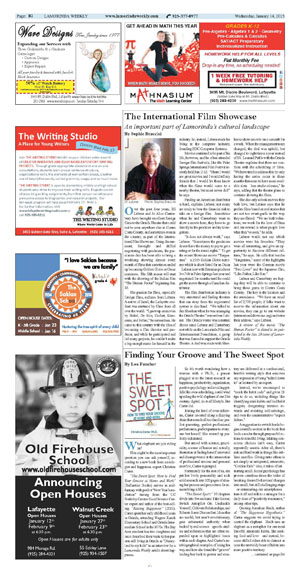|
|
Published January 14th, 2015
|
Finding Your Groove and The Sweet Spot
|
|
| By Lou Fancher |
 |
| |
What elephant are you riding on?
 This might be the most important question you can ask yourself, according to a new book from sociologist and happiness expert Christine Carter.
This might be the most important question you can ask yourself, according to a new book from sociologist and happiness expert Christine Carter.
 "The Sweet Spot: How to Find Your Groove at Home and Work" (Ballantine Books) arrives in mid-January with perfect "New Year's resolution" timing from the UC Berkeley Greater Good Science Center expert and author of the best-selling "Raising Happiness" (2011). Carter spent her early childhood years in Orinda, attending Wagner Ranch Elementary School and Orinda Intermediate School in the 1970s. The Bay Area resident has two daughters and once described their visits to her parents still living in Orinda as "Disneyland to my kids" in an interview for a Lamorinda Weekly article about happiness.
"The Sweet Spot: How to Find Your Groove at Home and Work" (Ballantine Books) arrives in mid-January with perfect "New Year's resolution" timing from the UC Berkeley Greater Good Science Center expert and author of the best-selling "Raising Happiness" (2011). Carter spent her early childhood years in Orinda, attending Wagner Ranch Elementary School and Orinda Intermediate School in the 1970s. The Bay Area resident has two daughters and once described their visits to her parents still living in Orinda as "Disneyland to my kids" in an interview for a Lamorinda Weekly article about happiness.
 So it's worth wondering how a woman with a Ph.D., a person plugged in to the latest research on happiness, productivity, organization, positive psychology and avoiding pitfalls like over-scheduling, could wind up riding the wild elephant of our 21st century, digital, do-it-all lifestyle. But Carter did.
So it's worth wondering how a woman with a Ph.D., a person plugged in to the latest research on happiness, productivity, organization, positive psychology and avoiding pitfalls like over-scheduling, could wind up riding the wild elephant of our 21st century, digital, do-it-all lifestyle. But Carter did.
 Joining the herd of over-achievers, Carter cavorted along a dizzying chain that sounds all too familiar: perfect parenting, perfect professional performance, perfect partner to everyone but herself. She wound up perfectly exhausted.
Joining the herd of over-achievers, Carter cavorted along a dizzying chain that sounds all too familiar: perfect parenting, perfect professional performance, perfect partner to everyone but herself. She wound up perfectly exhausted.
 But armed with science, practicality, a sense of humor and actually, frustration at finding herself enervated and disempowered at the intersection of professional success and personal sacrifice, Carter regrouped.
But armed with science, practicality, a sense of humor and actually, frustration at finding herself enervated and disempowered at the intersection of professional success and personal sacrifice, Carter regrouped.
 Fortunately for the rest of us, she put her lively personality and rock solid research into 320 pages of sharing her process and procedures for reassembling a life.
Fortunately for the rest of us, she put her lively personality and rock solid research into 320 pages of sharing her process and procedures for reassembling a life.
 "The Sweet Spot's" 10 chapters divide into five sections: Take Recess; Switch Autopilot On; Unshackle Yourself; Cultivate Relationships; and Tolerate Some Discomfort. Ideas that are useful, but aren't revolutionary, gain substantial authority when backed by real science - specific studies and references that are often expanded upon in highlighted boxes within each chapter. And Carter's autobiographical examples of losing her way and how she found the "groove" leading her back to power and mastery are delivered in a confessional, humble writing style that removes any impression of being "talked down to" or lectured by an expert.
"The Sweet Spot's" 10 chapters divide into five sections: Take Recess; Switch Autopilot On; Unshackle Yourself; Cultivate Relationships; and Tolerate Some Discomfort. Ideas that are useful, but aren't revolutionary, gain substantial authority when backed by real science - specific studies and references that are often expanded upon in highlighted boxes within each chapter. And Carter's autobiographical examples of losing her way and how she found the "groove" leading her back to power and mastery are delivered in a confessional, humble writing style that removes any impression of being "talked down to" or lectured by an expert.
 Instead, we're encouraged to "crack the habit code" and given 21 tips to do so, including things like identifying mini-habits and bad habit triggers, designating intrinsic rewards and resisting self-sabotage, and even the counterintuitive "expect failure."
Instead, we're encouraged to "crack the habit code" and given 21 tips to do so, including things like identifying mini-habits and bad habit triggers, designating intrinsic rewards and resisting self-sabotage, and even the counterintuitive "expect failure."
 A suggestion to switch herds begins a terrific section in the book that leads a reader through purposeful actions to mindful living. Making conscious choices isn't easy, Carter repeatedly asserts. After all, there's risk and hard work in things like sublime sacrifice. Giving unto others is not simply an antiquated, automatic, "Golden Rule" idea, it takes effort - starting small. Social psychology has proven countless times the value of breaking desired behavioral changes into small, but still challenging steps - or outsmarting our smartphones - turn it off and talk to a stranger for a daily dose of "positivity resonance," among other tips.
A suggestion to switch herds begins a terrific section in the book that leads a reader through purposeful actions to mindful living. Making conscious choices isn't easy, Carter repeatedly asserts. After all, there's risk and hard work in things like sublime sacrifice. Giving unto others is not simply an antiquated, automatic, "Golden Rule" idea, it takes effort - starting small. Social psychology has proven countless times the value of breaking desired behavioral changes into small, but still challenging steps - or outsmarting our smartphones - turn it off and talk to a stranger for a daily dose of "positivity resonance," among other tips.
 Quoting Jonathan Haidt, author of "The Happiness Hypothesis," Carter suggests we avoid trying to control the elephant - Haidt uses an elephant as a metaphor for our most forceful, automatic habits, like seeking food and love - and instead, become skilled riders able to distract or coax the unwieldy beast of habits into more positive territory.
Quoting Jonathan Haidt, author of "The Happiness Hypothesis," Carter suggests we avoid trying to control the elephant - Haidt uses an elephant as a metaphor for our most forceful, automatic habits, like seeking food and love - and instead, become skilled riders able to distract or coax the unwieldy beast of habits into more positive territory.
 Life-changing results, Carter writes, require undergoing the book's final processes: careful consideration of grudges, perfectionism, illegitimate fears, and tangled thoughts leading a person to believe he or she "has been a failure my whole life" and similar exaggerations. Essentially, studies show that getting hooked on negative thoughts and interactions can become a way to avoid taking responsibility and course-correcting.
Life-changing results, Carter writes, require undergoing the book's final processes: careful consideration of grudges, perfectionism, illegitimate fears, and tangled thoughts leading a person to believe he or she "has been a failure my whole life" and similar exaggerations. Essentially, studies show that getting hooked on negative thoughts and interactions can become a way to avoid taking responsibility and course-correcting.
 "Finding your groove" isn't easy, but once found, Carter's science-backed techniques operate from a position of power - the "sweet spot" athletes, artists, scientists and everyone desires.
"Finding your groove" isn't easy, but once found, Carter's science-backed techniques operate from a position of power - the "sweet spot" athletes, artists, scientists and everyone desires.

|
|
|
|
|
|
|
|
|
| |
|
|
|
|



